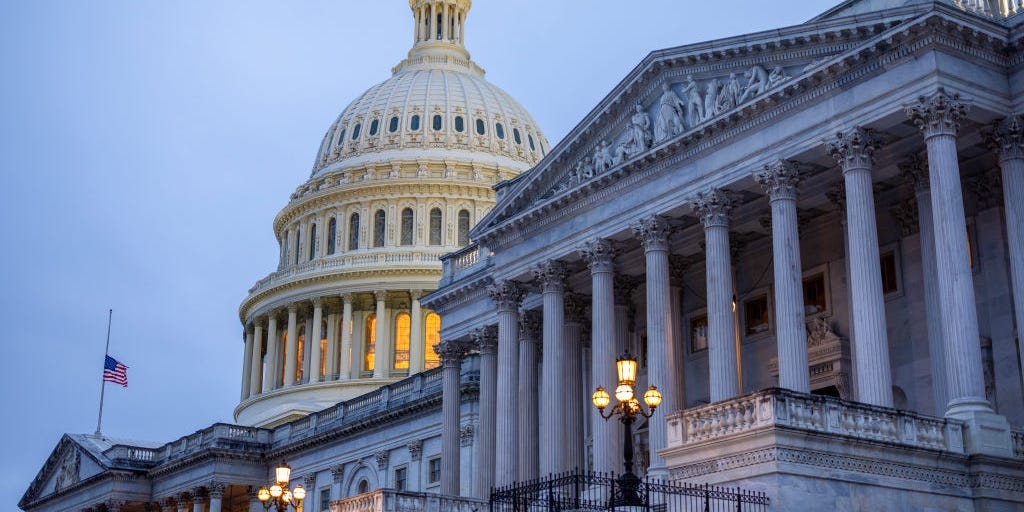Even though new bills are being proposed to rein him in, don’t hold your breath waiting for Congress to stop President Donald Trump’s sweeping tariff plan.
Republican Sen. Charles Grassley of Iowa and Democratic Sen. Maria Cantwell of Washington on Thursday introduced a Senate bill to limit a president’s power to impose tariffs. The bill would allow Congress to vote to end any tariff at any time, require the president to provide Congress with 48 hours’ notice before imposing any new duties, and require Congress to explicitly approve any new tariffs within 60 days.
Four additional Republicans — Mitch McConnell of Kentucky, Lisa Murkowski of Alaska, Thom Tillis of North Carolina, and Jerry Moran of Kansas — have signed on as co-sponsors to the bill. Republican Rep. Don Bacon has also said he’ll introduce a companion House bill with similar provisions.
Business Insider spoke to four political scientists who each said that, while the bills proposed by the Republican lawmakers represent the first time some members of the president’s party have split with him publicly since the election, the proposals are largely symbolic objections and are all but guaranteed not to pass because, even with the support of Democratic lawmakers, the bills simply won’t have enough votes.
“Congress has the ability, but Congress, as it’s currently constituted, does not have the will,” Justin Crowe, a professor of political science at Williams College, told BI. “There’s virtually no chance, at least in the near term. Were we to be in a fuller-blown trade war and we had some kind of economic downturn of a serious magnitude over the next number of months, potentially, you could see Congress trying to step in. But in the near term, that seems remarkably, vanishingly unlikely.”
Justin Buchler, an associate professor of political science at Case Western Reserve University, told BI that, technically, the proposed bills shouldn’t even be necessary since the Constitution grants Congress the exclusive power to levy tariffs and duties. However, in recent years, lawmakers have taken a less active role in doing so, instead allowing the executive branch to execute tariff policies within the guidelines defined by Congress.
Congress won’t claw back its trade power
Six different statutes exist to control how the president can use tariffs. Only three carve-outs exist to allow the president to impose tariffs without a congressional investigation. Still, only one has ever been used: the International Emergency Economic Powers Act of 1977, which allows the president to declare an emergency under the National Emergency Act to regulate or prohibit imports.
Trump cited that power on Wednesday when he announced sweeping 10% tariffs on goods imported from almost every country into the United States and even higher tariffs for 60 trading partners with a persistent trade deficit with the US.
According to the National Constitution Center, the other two presidential tariff carve-outs, which have never been used, stem from the Trade Act of 1974 and the Tariff Act of 1930. Portions of these laws allow the president to enact temporary tariffs to address balance-of-payments deficits and tariffs on goods from foreign countries that discriminate against US commerce in certain ways.
But the political scientists told Business Insider not to expect Congress to try to claw back its trade power in any real way.
“We’re in this weird position where, constitutionally, no legislation should be necessary because what Donald Trump is doing is so far beyond the bounds of what the Constitution permits that nothing should be happening at all,” Buchler said. “But the courts aren’t going to stop him, and given that there’s no way that Congress is going to reach a veto override point — and probably can’t even get anything through the House, given that Mike Johnson is not likely to let anything come up for a vote — it’s probably a moot point.”
Supply chain experts and economists previously told Business Insider that Trump’s wide-reaching “Liberation Day” tariffs are expected to result in higher prices for everything from pantry staples like coffee and sugar to apparel and larger purchases like cars and appliances. The market has tanked in response to global trade uncertainty, with stocks suffering their worst single-day loss in five years on Thursday.
And while members of Congress are no doubt aware of the economic turmoil stemming from Trump’s aggressive trade strategy, there’s little incentive to risk using up their political cache on a losing battle — at least for now.
“I think they’re going to wait to see whether their constituents complain,” Susan McWilliams Barndt, a professor of politics at Pomona College, told BI. “I think they’re really going to wait to see if their constituents tie their complaints to the tariffs, and then I think it’s going to be a couple of weeks before we really see any real response from Congress.”
Patricia Crouse, a professor of political science at the University of New Haven, agreed, telling BI she expects “The only real pushback may come if it costs Republicans seats in the 2026 election.”
Read the full article here


